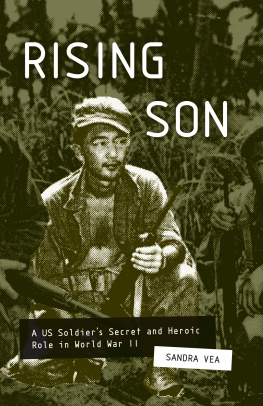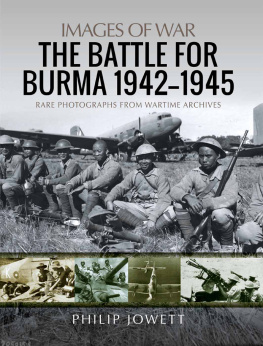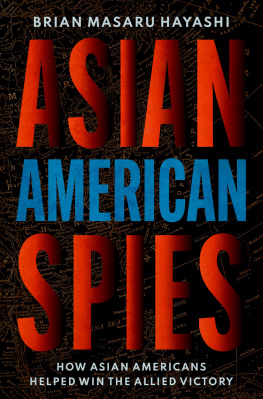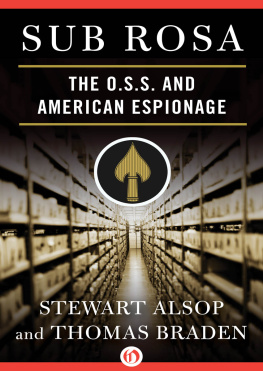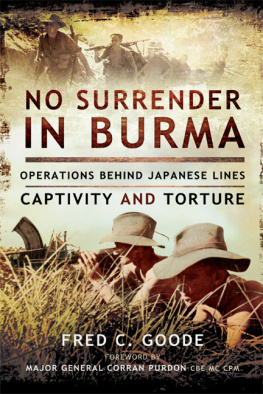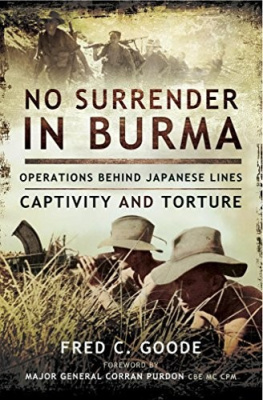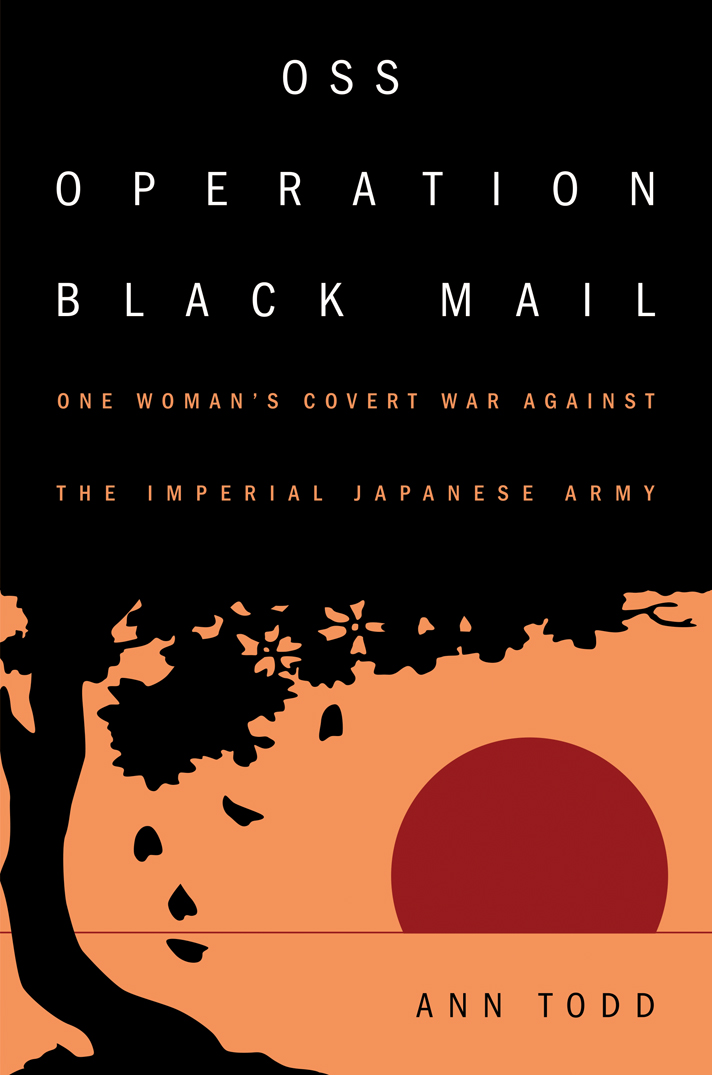

This book has been brought to publication with the generous assistance of Marguerite and Gerry Lenfest.

Naval Institute Press
291 Wood Road
Annapolis, MD 21402
2017 by Ann Todd
All rights reserved. No part of this book may be reproduced or utilized in any form or by any means, electronic or mechanical, including photocopying and recording, or by any information storage and retrieval system, without permission in writing from the publisher.
Library of Congress Cataloging-in-Publication Data
Names: Todd, Ann, author.
Title: OSS Operation Black Mail: one womans covert war against the Imperial Japanese Army / Ann Todd.
Description: Annapolis, Maryland: Naval Institute Press, [2017] | Includes bibliographical references and index. Identifiers: LCCN 2017013058 (print) | LCCN 2017013937 (ebook) | ISBN 9781682471517 (eBook)
Subjects: LCSH: McIntosh, Elizabeth P., 19152015. | Women spiesUnited StatesBiography. | United States. Office of Strategic ServicesBiography. | World War, 19391945Secret serviceUnited States. | World War, 19391945CampaignsAsia. | World War, 19391945Psychological aspects.
Classification: LCC D810.S8 (ebook) | LCC D810.S8 M368 2017 (print) | DDC 940.54/8673092 [B] dc23
LC record available at https://lccn.loc.gov/2017013058
Map created by Chris Robinson.

 Print editions meet the requirements of ANSI/NISO z39.48-1992 (Permanence of Paper).
Print editions meet the requirements of ANSI/NISO z39.48-1992 (Permanence of Paper).
25 24 23 22 21 20 19 18 17 9 8 7 6 5 4 3 2 1
First printing
The men and women of the OSS fought a different, often invisible war, one for which few medals were given. This book is an homage to them, all of them, on every front.
Table of Contents
Guide
CONTENTS
F or eighty-six-year-old Elizabeth Betty McIntosh, the morning of September 11, 2001, was very much like one sixty years before. On December 7, 1941, the sparkling blue sky over Bettys little house on Oahu filled with waves of Japanese bombers. The roiling smoke and flames erupting from the Twin Towers on 9/11 looked identical to the smoke and flames that had emanated from the ruined white ships in Pearl Harbor. Shaking off the memory, Betty snatched up the phone, muting the volume on her television but continuing to watch the horrific scene unfolding. As an Office of Strategic Services (OSS) living legend and a retired case officer, she had no problem reaching the Central Intelligence Agencys Directorate of Operations and was put through to her old department, the Special Activities Division.
Put me back to work, she said.

Before CIA there was OSS. Colorful histories of OSS abound. First and foremost on the bookshelf is scholarship on the luminous founder of OSS, William J. Donovan. There are also thrilling accounts of Jedburgh teams training and fighting with the French Resistance, frogmen pioneering underwater special warfare, and the daring exploits of Operation Norso in Norway. And then there are the biographies and autobiographies of those who went on to become CIA directors: Allen Dulles, William Colby, Richard Helms, William J. Casey. The overwhelming majority of these treatments center on World War II as it unfolded in Europe, the Mediterranean, and North Africa. OSS Operation Black Mail is a different, less prosaic narrative of OSSthe story of a remarkable woman who fought on a different front, in a remote and often overlooked theater of war.
Elizabeth P. McIntosh was a trailblazer in the art of psychological warfare, which she waged against the Japanese in the China-Burma-India theater of operations (CBI), a place at the time often referred to as Confused Beyond Imagination. Her craft was black propaganda, and her mission was to demoralize the enemy through prevarication and deceit and, ultimately, to convince him to surrender. Donovan himself believed fervently in the efficacy of psychological warfare, and in 1943 he added a branch, Morale Operations (MO), to his growing organization. The people recruited for this latecomer were of a different ilk from those drawn out of the ranks of Yale, Harvard, and other esteemed faculties who populated Donovans Research and Analysis (R&A) Branch. They were not elite soldiers poached from the regular armed forces or movie stars who flocked to OSS in search of adventure and the chance to make a difference. MO brought in a wave of artists, journalists, and people who were deeply familiar with the languages and cultures of far-flung parts of the globe. Creative types. Professionals, many too old to enlist but eager to join the war, preferably over there. The scholars, writers, and artists destined for Asia had, through their own careers and interests, sought to understand the cultures of that part of the world as an end in itself. Now that understanding would be used to find weaknesses in a culture, to attack the unity of that culture, or, as one scholar put it, to crack the enemys culture up, not just crack it open.
The deceptive part of black propaganda is and was point of origin. A newspaper was made to look as if it came off the presses in Berlin or Tokyo when actually it was painstakingly replicated, cut, pasted, and printed in Washington or Calcutta. A radio program purported to be broadcast from Tokyo when really it was being beamed from a tiny hand-cranked generator in Chittagong.

Betty McIntosh once said, Never again would I feel so alive, so completely engaged in something I knew would never come around again. She served a total of eighteen life-changing months in India and China before she eventually entered service in the CIA, from which she retired in 1973. During those eighteen months, she met and worked with people as diverse as Allen Dulles, Julia Child, and Ho Chi Minh. She ordered the killing of a Japanese courier in the jungles of Burma to plant a false surrender order in his mailbag. She obtained the complete cooperation of a surly enemy prisoner of war (POW) to craft that order, copies of which were clutched in the hands of Japanese soldiers walking out of the jungle in 1945. The title of this book, OSS Operation Black Mail, refers to the many and various ways Betty and her crew obtained and altered personal correspondence between Japanese soldiers and their families on the home islands of Japan. By the time Betty was transferred to China, she had been made Acting Head of MO for CBI. Although more than forty-five hundred women served in OSS, to be made acting head of an operational branch over an entire theater was a stunning achievement. She was extremely good at demoralizing and deceiving the Japanese simply because she admired them and had spent a great deal of time immersed in their culture. She targeted not merely the Japanese soldier but the man within: the son, the husband, the father. She knew her work could ultimately save lives but never lost sight of the fact that her propaganda was a weapon, and her intended recipients the enemy.


